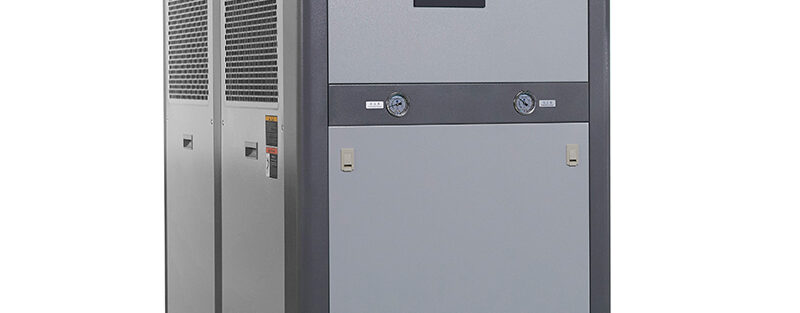Temperature regulation is of top priority in the extremely demanding business of food processing, and product quality, shelf life, and uncompromising compliance with safe procedures are its ultimate requirements. Of all the equipment required to ensure precise temperature control, the most vital is the low-temperature industrial water chiller. Due to their effective and efficient cooling function, these units are a necessity at every stage of food production, from processing and warehousing to packaging and transportation.
Why Temperature Control is Important in the Food Industry
Food safety laws require temperature control to the letter to prevent the growth of lethal bacteria and keep products fresh and edible. From meat to milk, beverages, to baked items, there is a need for a correct temperature in processing and storage. A water chiller is a much-needed piece by serving as a constant source of cold water used in chilling ingredients, equipment, and setups where stringent conditions are needed.
The industrial water chiller is particularly valued for its capability to drop temperatures quickly with energy efficiency and dependability. To food processors, this means lower spoilage risk and overall product uniformity.
Low-Temperature Industrial Water Chillers in food applications
A low-temperature industrial water chiller is capable of operating at sub-zero or frosty temperatures and is most suited to specific food processing operations needing exact and efficient chilling. Some of the most important uses are:
Food Processing: Meat processing and poultry processing factories employ chillers to rapidly cool meat and avoid bacterial growth. Similarly, in the dairy processing business, chillers are employed to regulate milk and other ingredients’ temperature to prevent spoilage.
Beverage Manufacturing: Industrial water chillers are utilized by breweries, bottling, and beverage processing to cool temperature levels most suitable for carbonation and fermentation. Temperature is maintained constant to maintain quality and taste.
Bakery and Confectionery: Chilled water is also widely applied in dough mixing to create the best conditions for yeast fermentation. Chocolate manufacturing also relies on cooling for tempering and setting up chocolate without compromising its texture.
Chilled Water or Glycol Solution Supplying: Food plants utilize water chillers on a large scale to supply chilled water or glycol solutions to refrigeration and freezer units to maintain products at safe storage temperatures.
Shipping and Packaging: Industrial water chillers are also integrated into some packaging lines to prevent heat-sensitive items from degrading or melting while being sealed and packaged.
Advantages of Low-Temperature Industrial Water Chillers in the Food Industry
Utilizing a low-temperature industrial water chiller provides many benefits to food companies:
Energy Efficiency: New chillers are designed to utilize energy to its optimum and provide higher cooling efficiency. This maintains the cost of operations low.
Temperature Accuracy: Advanced control systems allow chillers to maintain temperature within close specifications, which is necessary for delicate foods.
Versatility: The industrial water chiller can be designed according to the particular requirements of various food processing operations, ranging from low-level operations to mass production factories.
Improved Product Quality: As chillers store food products in optimal conditions, they maintain food products with the desired product quality of taste, texture, and nutritional value.
Food Applications for Water Chillers: Trends and Advances
The food industry continues to demand more energy-efficient and sustainable solutions. Industrial chiller manufacturers are rising to the challenge with variable-speed compressors, environmentally friendly refrigerants, and real-time temperature-adjusting and monitoring smart control systems. Not only do these reduce environmental impact, but they also enhance performance and reliability.
In addition, the use of low-temperature industrial water chillers is increasingly discovering additional applications in frozen food production as the entire frozen food industry on a global scale continues to grow. To produce ultra-low temperatures without ballooning energy costs is increasingly becoming a competitive advantage for food processors who wish to stay competitive.
Choosing the Appropriate Food Processing Water Chiller
The selection of the right water chiller is based on understanding the exact cooling needs of a company. Cooling capacity, degree of temperature, and the kind of refrigerant used are all factors in selecting the right water chiller. An experienced industrial chiller supplier who is on hand to design the system and install it into existing food production lines is necessary.
Conclusion
In the efficient, safe, and high-quality food industry, the place of the low-temperature industrial water chiller is certainly not trivial. While they are part of ensuring consistency in upgraded products, they assist with regulatory compliance, making these systems a significant component of contemporary food processing and storage. With technology going on further to improve, high-tech industrial water chillers will contribute even more to enabling food manufacturers to rise to higher expectations from international markets.




